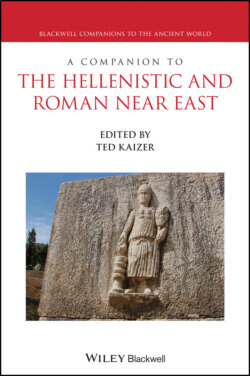Читать книгу A Companion to the Hellenistic and Roman Near East - Группа авторов - Страница 59
Jewish Hellenistic Writings in the Land of Israel
ОглавлениеJewish sources dating from the late-fourth to third centuries BCE relating to life and events in the Land of Israel, then under the authority of the Greek-speaking Ptolemaic dynasty, are scant. The Zeno papyri, which date to the reign of Ptolemy II Philadelphus (282–246 BCE), cast some light on the economic and social conditions there (Tcherikover and Fuks 1957–64: 115–130; Tcherikover 1959: 60). Not least do they attest to the excellent relationship which seems to have existed between Ptolemy and the powerful Jewish magnate Tobias, who resided at Birta in Ammanitis. Tobias was a descendant of the same family as a man also named Tobias recorded in the Hebrew Bible (Neh. 3:35; 4:1); and a representative of this same family was later to be implicated in events which would lead to violent confrontation between Jews and their Greek-speaking overlords (2 Macc. 3:10–11). This family, usually referred to as the Tobiads, seems to have exercised considerable influence in its heyday. Traditions about it reported by Josephus (particularly AJ 12.154–236), while historically problematic in many respects, may cast light on the situation in the Transjordan during the third century BCE (Goldstein 1975; Fuks 2001; but see also D.R. Schwartz 1998 and 2002); and archaeological excavations of the Tobiad palace at ‘Araq el-Emir have served to confirm reports of the power and extensive influence of this family (Rosenberg 2006).
But confrontation, when it arose in the 170s and 160s BCE, was not between the Jews and the Ptolemies; because in 200 BCE power over Jerusalem and its surrounding territory had passed to the Seleucid Empire, Antiochus III (222–187 BCE) having defeated his rival Ptolemy V Epiphanes at the battle of Panion. Josephus (AJ 12.138–146) has preserved a letter and decree of Antiochus III, which seem to confirm certain privileges already accorded to the Jews in the time of the Ptolemies (Bickermann 1980). The letter, addressed to Ptolemy governor of Coele-Syria, refers to the system of government in operation among the Jews: central to this are the priests and scribes of the temple, who are named alongside a gerousia (AJ 12.138, 142). This “council of elders” is mentioned also by Hecataeus of Abdera in his discussion of Jewish institutions in the time of the Ptolemies (Stern and Murray 1973; Mendels 1983); and it may be significant that a gerousia was a distinctive element in the constitution of Sparta, a city with which Jews in the time of Jonathan Maccabee (153–144 BCE) were to claim an affinity (1 Macc. 12:2, 5–23). The decree of Antiochus accords privileges to the Temple and the priests (AJ 12.145–146).
The centrality of the latter in Jewish life when the Seleucids took control is underscored by a major Jewish writer and teacher of this period, Jesus ben Sira (Beentjes 1997); and neither he, nor his hero the Zadokite high priest Simon II (the subject of Ben Sira 50:1–21) seem unduly perturbed about the change of overlords which occurred in their days. Ben Sira’s Wisdom book, composed in Hebrew and translated into Greek by his grandson (included in LXX under the title Sirach, and later known among Christians as Ecclesiasticus) displays no overt signs of political tension. While Ben Sira’s book may betray anxieties about relations between the rich and the poor, the powerful and the less privileged in Jewish society, the author is generally content with the world he inhabits. Significantly, he envisages no necessary conflict between Greek and Jewish spheres: he himself indirectly quotes Homer (14:18; cf. Iliad 6.146–149), clearly knows well the poetry of Theognis; and is even conversant with Egyptian Wisdom writings (Skehan and di Lella 1987). He emphatically advises his students to travel (34:10; 39:4); and, if he remains steadfast in his profound commitment to Judaism, and firm in his conviction that wisdom is embodied in the Torah and the service of the high priest in Jerusalem’s temple, this is not at the expense of the non-Jewish world, since he is firmly of the opinion that Wisdom has, in some measure, been granted to all humanity (Marböck 1999).
